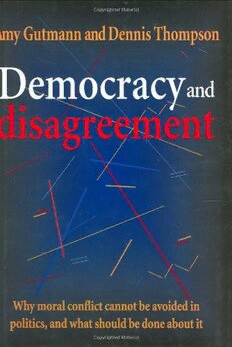
Democracy and Disagreement PDF
Preview Democracy and Disagreement
Democracy and Disagreement Democracy and Disagreement Amy Gutmann Dennis Thompson Contents Acknowledgments Vii Introduction 1 Persistence of Moral Disagreement 11 Sense of Reciprocity 52 Value of Publicity 95 Scope of Accountability 128 Promise of Utilitarianism 165 Constitution of Deliberative Democracy 199 Latitude of Liberty 230 Obligations of Welfare 273 Ambiguity of Fair Opportunity 307 Conclusion 346 Notes 363 Index 411 Acknowledgments This book grew out of our experience in teaching courses on political ethics, jointly and separately, at two universities during the past decade. Our students would probably not recognize the product, which took on a life of its own well beyond what we taught in our courses. But we learned much from our students. The discussions we had with them gave us some reason to believe that men and women of very different backgrounds and quite divergent moral views can argue with mutual respect about controversial issues of public policy. The discussions we had with each other forced us to look hard for ways to maintain mutual respect in the face of vigorous disagreement. The hard-won agreement between its authors that this book expresses is not a modus vivendi: both of us contributed equally to every chapter, and both of us are equally committed to all the arguments and conclusions of the book. But the agreement, like the product of democratic deliberation, should no doubt be considered provisional. We have presented some of the arguments of this book previously in a different form. Chapter 1 is a substantially revised version of our "Moral Disagreement in a Democracy," which appeared in Social Philosophy and Policy, 12 (Winter 1995): 87-110. Copyright © 1995 by Cambridge University Press. Portions of Chapter 2 are drawn from our "Moral Conflict and Political Consensus," Ethics, 100 (October 1990): 64-88. We are grateful to our many friends and colleagues who gave generously of their time in deliberating with us about the ideas and arguments in this book. Frederick Schauer, Cass Sunstein, and Alan Wertheimer provided invaluable comments on the entire manuscript. We also received helpful suggestions on drafts of individual chapters from Arthur Applbaum, Charles Beitz, Sissela Bok, Ezekiel Emanuel, David Estlund, Peter Euben, Robert Fullinwider, Fred Greenstein, Jane Mansbridge, Peter de Marneffe, Henry Richardson, Mark Sagoff, Debra Satz, Thomas Scanlon, and Kenneth Winston. The notes are more complete and accurate as a result of the astute research conducted by Stuart White, who also gave us helpful comments on every chapter. Additional research assistance was ably provided by Ted Aaberg, Carole Gunning, and Simone Sandy. Helen Hawkins, Valerie Kanka, and Jean McVeigh skillfully managed the complex logistics of researching, writing, and revising a manuscript by two authors working in two different locations. Our greatest debts are to Michael Doyle and Carol Thompson, whose support-personal and intellectualsustained us through the writing of this book. Democracy and Disagreement Introduction OF THE CHALLENGES that American democracy faces today, none is more formidable than the problem of moral disagreement. Neither the theory nor the practice of democratic politics has so far found an adequate way to cope with conflicts about fundamental values. We address the challenge of moral disagreement here by developing a conception of democracy that secures a central place for moral discussion in political life. Along with a growing number of other political theorists, we call this conception deliberative democracy. The core idea is simple: when citizens or their representatives disagree morally, they should continue to reason together to reach mutually acceptable decisions. But the meaning and implications of the idea are complex. Although the idea has a long history, it is still in search of a theory. We do not claim that this book provides a comprehensive theory of deliberative democracy, but we do hope that it contributes toward its future development by showing the kind of deliberation that is possible and desirable in the face of moral disagreement in democracies. Some scholars have criticized liberal political theory for neglecting moral deliberation. Others have analyzed the philosophical foundations of deliberative democracy, and still others have begun to explore institutional reforms that would promote deliberation. Yet nearly all of them stop at the point where deliberation itself begins. None has systematically examined the substance of deliberation-the theoretical principles that should guide moral argument and their implications for actual moral disagreements about public policy. That is our subject, and it takes us into the everyday forums of democratic politics, where moral argument regularly appears but where theoretical analysis too rarely goes. Deliberative democracy involves reasoning about politics, and nothing has been more controversial in political philosophy than the nature of reason in politics. We do not believe that these controversies have to be settled before deliberative principles can guide the practice of democracy. Since on occasion citizens and their representatives already engage in the kind of reasoning that those principles recommend, deliberative democracy simply asks that they do so
